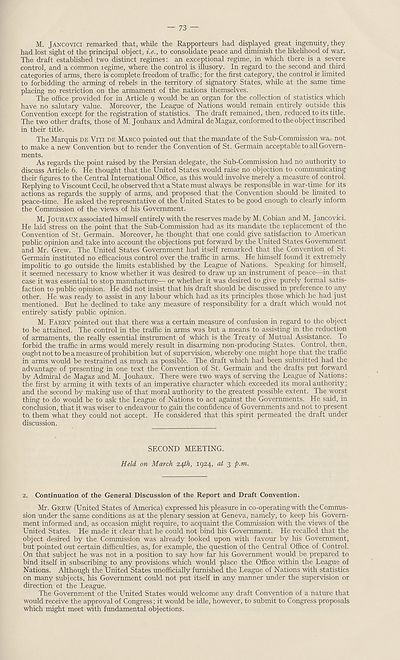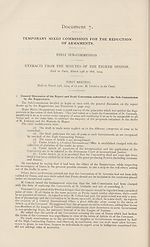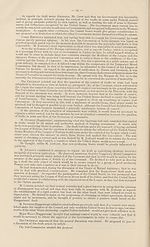Armament > Conference for the control of the international trade in arms, munitions and implements of war
(75)
Download files
Complete book:
Individual page:
Thumbnail gallery: Grid view | List view

— 73
M. Jancovici remarked that, while the Rapporteurs had displayed great ingenuity, they
had lost sight ot the principal object, i.e., to consolidate peace and diminish the likelihood of war.
The draft established two distinct regimes: an exceptional regime, in which there is a severe
control, and a common xegime, where the control is illusory. In regard to the second and third
categories of arms, there is complete freedom of traffic; for the first category, the control is limited
to forbidding the arming of rebels in the territory of signatory States, while at the same time
placing no restriction on the armament of the nations themselves.
The office provided for in Article 9 would be an organ for the collection of statistics which
have no salutary value. Moreover, the League of Nations would remain entirely outside this
Convention except for the registration of statistics. The draft remained, then, reduced to its title.
The two other drafts, those of M. Jouhaux and Admiral deMagaz, conformed to the object inscribed
in their title.
The Marquis de Viti de Marco pointed out that the mandate of the Sub-Commission wa^ not
to make a new Convention but to render the Convention of St. Germain acceptable to all Govern¬
ments.
As regards the point raised by the Persian delegate, the Sub-Commission had no authority to
discuss Article 6. He thought that the United States would raise no objection to communicating
their figures to the Central International Office, as this would involve merely a measure of control.
Replying to Viscount Cecil, he observed that a State must always be responsible in war-time for its
actions as regards the supply of arms, and proposed that the Convention should be limited to
peace-time. He asked the representative of the United States to be good enough to clearly inform
the Commission of the views of his Government.
M. Jouhaux associated himself entirely with the reserves made by M. Cobian and M. Jancovici.
He laid stress on the point that the Sub-Commission had as its mandate the leplacement of the
Convention of St. Germain. Moreover, he thought that one could give satisfaction to American
public opinion and take into account the objections put forward by the United States Government
and Mr. Grew. The United States Government had itself remarked that the Convention of St.
Germain instituted no efficacious control over the traffic in arms. He himself found it extremely
impolitic to go outside the limits established by the League of Nations. Speaking for himself,
it seemed necessary to know whether it was desired to draw up an instrument of peace-—in that
case it was essential to stop manufacture— or whether it was desired to give purely formal satis¬
faction to public opinion. He did not insist that his draft should be discussed in preference to any
other. He was ready to assist in any labour which had as its principles those which he had just
mentioned. But he declined to take any measure of responsibility for a draft which would not
entirely satisfy public opinion.
M. Fabry pointed out that there was a certain measure of confusion in regard to the object
to be attained. The control in the traffic in arms was but a means to assisting in the reduction
of armaments, the really essential instrument of which is the Treaty of Mutual Assistance. To
forbid the traffic in arms would merely result in disarming non-producing States. Control, then,
ought not to be a measure of prohibition but of supervision, whereby one might hope that the traffic
in arms would be restrained as much as possible. The draft which had been submitted had the
advantage of presenting in one text the Convention of St. Germain and the drafts put forward
by Admiral de Magaz and M. Jouhaux. There were two ways of serving the League of Nations:
the first by arming it with texts of an imperative character which exceeded its moral authority;
and the second by making use of that moral authority to the greatest possible extent. The v/orst
thing to do would be to ask the League of Nations to act against the Governments. He said, in
conclusion, that it was wiser to endeavour to gain the confidence of Governments and not to present
to. them what they could not accept. He considered that this spirit permeated the draft under
discussion.
SECOND MEETING.
Held on March 2\th, 1924, at 3 p.m.
2. Continuation of the General Discussion of the Report and Draft Convention.
Mr. Grew (United States of America) expressed his pleasure in co-operating with the Commis¬
sion under the same conditions as at the plenary session at Geneva, namely, to keep his Govern¬
ment informed and, as occasion might require, to acquaint the Commission with the views of the
United States. He made it clear that he could not bind his Government. He recalled that the
object desired by the Commission was already looked upon with favour by his Government,
but pointed out certain difficulties, as, for example, the question of the Central Office of Control.
On that subject he was not in a position to say how far his Government would be prepared to
bind itself in subscribing to any provisions which would place the Office within the League of
Nations. Although the United States unofficially furnished the League of Nations with statistics
on many subjects, his Government could not put itself in any manner under the supervision or
direction of the League.
The Government of the United States would welcome any draft Convention of a nature that
would receive the approval of Congress; it would be idle, however, to submit to Congress proposals
which might meet with fundamental objections.
M. Jancovici remarked that, while the Rapporteurs had displayed great ingenuity, they
had lost sight ot the principal object, i.e., to consolidate peace and diminish the likelihood of war.
The draft established two distinct regimes: an exceptional regime, in which there is a severe
control, and a common xegime, where the control is illusory. In regard to the second and third
categories of arms, there is complete freedom of traffic; for the first category, the control is limited
to forbidding the arming of rebels in the territory of signatory States, while at the same time
placing no restriction on the armament of the nations themselves.
The office provided for in Article 9 would be an organ for the collection of statistics which
have no salutary value. Moreover, the League of Nations would remain entirely outside this
Convention except for the registration of statistics. The draft remained, then, reduced to its title.
The two other drafts, those of M. Jouhaux and Admiral deMagaz, conformed to the object inscribed
in their title.
The Marquis de Viti de Marco pointed out that the mandate of the Sub-Commission wa^ not
to make a new Convention but to render the Convention of St. Germain acceptable to all Govern¬
ments.
As regards the point raised by the Persian delegate, the Sub-Commission had no authority to
discuss Article 6. He thought that the United States would raise no objection to communicating
their figures to the Central International Office, as this would involve merely a measure of control.
Replying to Viscount Cecil, he observed that a State must always be responsible in war-time for its
actions as regards the supply of arms, and proposed that the Convention should be limited to
peace-time. He asked the representative of the United States to be good enough to clearly inform
the Commission of the views of his Government.
M. Jouhaux associated himself entirely with the reserves made by M. Cobian and M. Jancovici.
He laid stress on the point that the Sub-Commission had as its mandate the leplacement of the
Convention of St. Germain. Moreover, he thought that one could give satisfaction to American
public opinion and take into account the objections put forward by the United States Government
and Mr. Grew. The United States Government had itself remarked that the Convention of St.
Germain instituted no efficacious control over the traffic in arms. He himself found it extremely
impolitic to go outside the limits established by the League of Nations. Speaking for himself,
it seemed necessary to know whether it was desired to draw up an instrument of peace-—in that
case it was essential to stop manufacture— or whether it was desired to give purely formal satis¬
faction to public opinion. He did not insist that his draft should be discussed in preference to any
other. He was ready to assist in any labour which had as its principles those which he had just
mentioned. But he declined to take any measure of responsibility for a draft which would not
entirely satisfy public opinion.
M. Fabry pointed out that there was a certain measure of confusion in regard to the object
to be attained. The control in the traffic in arms was but a means to assisting in the reduction
of armaments, the really essential instrument of which is the Treaty of Mutual Assistance. To
forbid the traffic in arms would merely result in disarming non-producing States. Control, then,
ought not to be a measure of prohibition but of supervision, whereby one might hope that the traffic
in arms would be restrained as much as possible. The draft which had been submitted had the
advantage of presenting in one text the Convention of St. Germain and the drafts put forward
by Admiral de Magaz and M. Jouhaux. There were two ways of serving the League of Nations:
the first by arming it with texts of an imperative character which exceeded its moral authority;
and the second by making use of that moral authority to the greatest possible extent. The v/orst
thing to do would be to ask the League of Nations to act against the Governments. He said, in
conclusion, that it was wiser to endeavour to gain the confidence of Governments and not to present
to. them what they could not accept. He considered that this spirit permeated the draft under
discussion.
SECOND MEETING.
Held on March 2\th, 1924, at 3 p.m.
2. Continuation of the General Discussion of the Report and Draft Convention.
Mr. Grew (United States of America) expressed his pleasure in co-operating with the Commis¬
sion under the same conditions as at the plenary session at Geneva, namely, to keep his Govern¬
ment informed and, as occasion might require, to acquaint the Commission with the views of the
United States. He made it clear that he could not bind his Government. He recalled that the
object desired by the Commission was already looked upon with favour by his Government,
but pointed out certain difficulties, as, for example, the question of the Central Office of Control.
On that subject he was not in a position to say how far his Government would be prepared to
bind itself in subscribing to any provisions which would place the Office within the League of
Nations. Although the United States unofficially furnished the League of Nations with statistics
on many subjects, his Government could not put itself in any manner under the supervision or
direction of the League.
The Government of the United States would welcome any draft Convention of a nature that
would receive the approval of Congress; it would be idle, however, to submit to Congress proposals
which might meet with fundamental objections.
Set display mode to:
![]() Universal Viewer |
Universal Viewer | ![]() Mirador |
Large image | Transcription
Mirador |
Large image | Transcription
Images and transcriptions on this page, including medium image downloads, may be used under the Creative Commons Attribution 4.0 International Licence unless otherwise stated. ![]()
| League of Nations > Armament > Conference for the control of the international trade in arms, munitions and implements of war > (75) |
|---|
| Permanent URL | https://digital.nls.uk/195382738 |
|---|
| Shelfmark | LN.IX |
|---|
| Description | Over 1,200 documents from the non-political organs of the League of Nations that dealt with health, disarmament, economic and financial matters for the duration of the League (1919-1945). Also online are statistical bulletins, essential facts, and an overview of the League by the first Secretary General, Sir Eric Drummond. These items are part of the Official Publications collection at the National Library of Scotland. |
|---|---|
| Additional NLS resources: |
|

